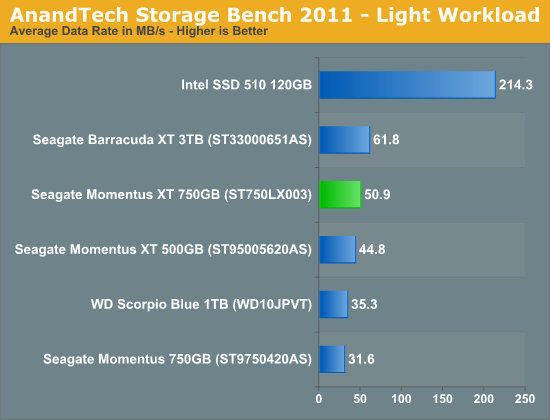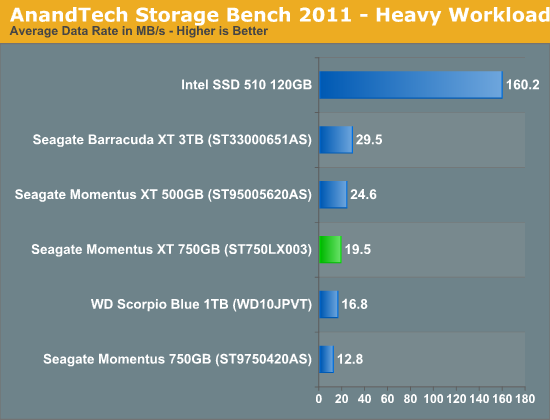Seagate 2nd Generation Momentus XT (750GB) Hybrid HDD Review
by Anand Lal Shimpi on December 13, 2011 12:51 AM EST- Posted in
- Storage
- Seagate
- Momentus XT
- Hybrid Drive
- HDDs
- SSHDs
AnandTech Storage Bench 2011
Admittedly most of the benchmarks on the previous page really portray the Momentus XT in the best light possible. The workloads are light enough to mate well with the 8GB cache and none of them are really write intensive. Over time however you'll encounter more varied workloads, including those that are write intensive or those that only access data once or twice. In workloads that aren't perfectly tailored to the Momentus XT's cache, the honeymoon is over before it began. We'll start with our light storage bench:

Here overall performance is definitely higher than any of the 2.5" drive offerings, including last year's 500GB Momentus XT. However compared to the 3.5" Barracuda XT, the newer Momentus XT is tangibly slower over the course of our test. If you look at performance compared to the Intel SSD 510, there's simply no competition.
Our trace based Storage Bench suites were designed to really stress SSDs, thus being more write intensive than your typical client workload. Not being able to cache writes at this point, the Momentus XT is penalized (perhaps unfairly) in these benchmarks. The results are valid however - when it comes to writing or non-repetitive workloads, the Momentus XT will perform like a good 2.5" hard drive rather than in the realm of SSD performance.
Our Heavy Storage Bench workload is even more write intensive. Furthermore, having been recorded on a Windows 7 pre-SP1 install, we see some of the potential penalties from moving to a 4KB sector drive. Most writes are 4KB aligned in Windows 7, however pre-SP1 there were still some significant cases where alignment could be an issue. Here we see the 750GB/4KB Momentus XT actually fall behind the 500GB drive with 512B sectors because of this difference:

I included these results because if you formatted your drive with Windows 7 and later applied SP1 to the install, you may see this sort of performance regression when moving to a 4KB sector drive. The only way to avoid this is to reformat your drive using Windows 7 SP1 and install from a Windows 7 SP1 DVD/image. In place upgrades won't avoid the alignment issues that are exhibited here. For a greater understanding of why 4KB sectors are necessary and why alignment can be problematic on these drives, have a look at our coverage here.










98 Comments
View All Comments
Anand Lal Shimpi - Tuesday, December 13, 2011 - link
According to Seagate the drive is still 9.5mm thick, just like the non-caching Momentus drive. I took a pair of calipers to the drive as well as a regular Momentus and both came up at just under 9.5mm (although my calipers aren't the super accurate variety, there could be some play in the numbers there). Do you have a reference to the 9.7mm figure?Still digging into FAST boot. If it works the way I think it works, it should be able to cache boot data from multiple OSes. Will find out for sure soon...
Take care,
Anand
Anand Lal Shimpi - Thursday, December 15, 2011 - link
Seagate provided a response to your second question:"The Momentus XT will learn multiple boot activities and retain the boot information for them in the boot partition. There should be no problem optimizing 2 or 3 different boot scenarios, but more than that may degrade the performance of the last first boot activity learned."
It's my understanding that it's not too hard to determine when a system is booting, the access pattern is fairly unique. The boot optimization simply looks for that pattern and has a small amount of NAND set aside for data that fits that pattern. Multiple OSes should trigger the optimization, but once you get beyond a certain threshold you do risk evicting useful data from the cache.
Take care,
Anand
b_flat - Tuesday, December 13, 2011 - link
No mention of the reliability?Head to the Seagate Forums or visit Amazon.com to see a list of continual problems with this drive
b_flat - Tuesday, December 13, 2011 - link
Amazon.comhttp://www.amazon.com/Seagate-Momentus-Solid-Hybri...
Seagate Forums
http://forums.seagate.com/t5/Momentus-XT-Momentus-...
Anand Lal Shimpi - Tuesday, December 13, 2011 - link
I mentioned the reliability issues in the video but I've added them to the conclusion as well. For what it's worth, both the old and the new Momentus XT have done well in my testbeds but as we've seen with SSDs in the past, that doesn't mean much.Take care,
Anand
Jonijc - Tuesday, December 13, 2011 - link
Hmmm....I only 5 star reviews on the new one: http://www.amazon.com/Seagate-Momentus-7200RPM-Hyb...
And 4 stars on the 500GB older one.
http://www.amazon.com/Seagate-Momentus-Solid-Hybri...
j
kmmatney - Tuesday, December 13, 2011 - link
I've had a 500GB XT drive for about a year - working great in a desktop computer. The $99 price seems like a steal now.applestooranges - Tuesday, December 13, 2011 - link
C'mon, the first Seagate Hybrid (released over a year ago?) was pretty much a joke, barely better than a normal 7200 rpm HDD. Anybody/everybody in the know could see this, but it somehow got praise from certain reviewers. Now, they release basically the same "non-innovative" and "non-effective" design, and it somehow gets a passing grade?50% better than nothing is still nothing.
I could spend half this much on an OCZ cache drive + a 1 TB HDD, and get twice (or 3x) the performance and more capacity.
these HDD guys just don't get it... how many years will it take them...
Anand Lal Shimpi - Tuesday, December 13, 2011 - link
I wouldn't say it's barely better than a normal 7200RPM hard drive, our numbers alone prove that's the case. As I mentioned in the conclusion however, my preference is still for an SSD + hard drive where possible. The Momentus XT really addresses the niche where you can only have one 2.5" drive and you need more capacity than an SSD can offer for whatever reason. In that case it does a decent enough job, but even then my preference would be for an internal SSD + external mass storage.Take care,
Anand
JNo - Tuesday, December 13, 2011 - link
Hi,don't often comment but really want to mention some possibilities that many seem to lack awareness of.
Firstly, I've read no mention, let alone review, of OCZ's Synapse Cache SSD on anandtech or of the NVELO dataplex software that drives it. It allows an entire SSD to cache an HDD but seems better than Intel SRT to me as faster and fewer limitations (no need for Z68 mobo, no SSD size limits). You can almost get a 3TB HDD to bench close to SSD speeds. I think they're looking to release the software one day too so you won't even need the proprietary OCZ SSD. Reviews:
http://www.storagereview.com/ocz_synapse_cache_ssd...
http://www.storagereview.com/nvelo_drives_storage_...
Secondly, you can get cheap optical drive bay HDD adaptor for laptops nowadays (ebay) so you can slot a second SSD/HDD where the optical was. This allows classic boot SSD + data HDD combo in laptops without mSATA. In fact it's a reason for me to look for lappies *with* an optical drive even though I'd otherwise prefer not to have one. Obviously this solution won't work for ultrabooks etc but still much more preferable to the Seagate Momentus for me.